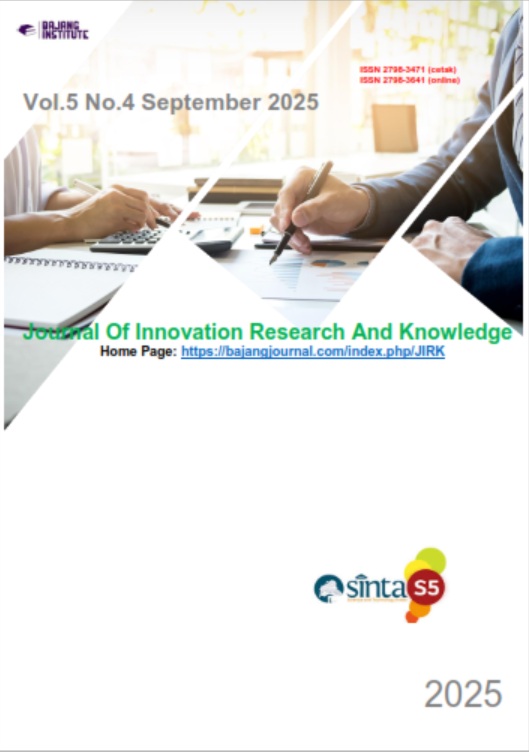AN ANALYSIS OF TASK-BASED LANGUAGE TEACHING (TBLT) APPROACH USED BY THE TEACHER IN WRITING SKILL AT BINA CITA MANDIRI (BCM) COURSE & COUNSELING
DOI:
https://doi.org/10.53625/jirk.v5i4.11192Keywords:
TBLT, Writing Skill, StudentsAbstract
Task-Based Language Teaching (TBLT) is a communicative approach to language teaching and learning that views language primarily as a tool for communication rather than as a subject of study. In this approach, learners engage with the language through meaningful tasks that are carefully designed and sequenced, allowing them to acquire and use the language in real-world, communicative contexts. The purpose of the research was to know how the teacher at BCM Course & Counseling apply Task-Based Language Teaching (TBLT) approach in teaching writing skill, and to know the obstacles are encountered in teaching English writing using the Task-Based Language Teaching (TBLT) method.The researcher used descriptive qualitative method. Three instruments were utilized observation, interview, and documentation for collecting the data. The subject was the English teacher at 5th Grade in BCM Course & Counseling, Palangka Raya. The researcher obtained the teacher at Bina Cita Mandiri (BCM) Course & Counseling utilized the TBLT approach by integrating a series of well-designed tasks into the English writing curriculum, which align with real-world activities. Tasks such as arranging sentences, translating words, and filling in blanks worksheets task from online resources like ISL Collective and Live Worksheet. Group discussions form a core part of the TBLT approach at BCM. Students are divided into small groups, and each group works collaboratively on the assigned writing tasks. The problems that the researcher found while observing and interviewing the teachers. There were students' cognitive abilities, difference in curricula, student attendance, motivations, and limited practice opportunities
References
Beccia, A. (2022). The Role of Theory in Empirical L2 Research on Task-Based Language Teaching for Young L2 Learners. Studies in Applied Linguistics & TESOL, 21(1), 32-40. Columbia University
Belda, J. (2021). Enhancing Multimodal Interaction and Communicative Competence through Task-Based Language Teaching (TBLT) in
Bhandari, L.P. (2020). Task-Based Language Teaching: A Current EFL Approach. Advances in Language and Literary Studies, 11(1).
Educational Journal. 4(1), 61-73.
Cholifah, M., & Siane, H. (2017). Pengajaran Bahasa Berbasis Tugas (Task Based Language Teaching): Pendekatan yang Efektif dalam Pengajaran Bahasa Inggris. Jurnal Ilmiah Bahasa dan Sastra. 4(2). DOI: 10.20448/journal.522.2021.74.235.243
Duong, T.M & Huyen, T.T.N. 2021. Implementing Task Based Language Teaching in Vietnamese Secondary Schools: What Hinders EFL Teachers? The Electronic Journal for English as a Second Language, 25(2).
Ellis, R. (2009). Task-based language teaching: sorting out the misunderstanding. International Journal of Applied Linguistics, 19(3). Shanghai International Studies University and University of Auckland.
Ellis, Rod. (2003). Tasked-based Language Learning and Teaching. OUP. Chapter 1, 27-33.
Ezer, F., & Selda, A. (2021). Opinions of Graduate Students of Social Studies Education about Qualitative Research Method. International Education Studies. 14(3), 15-20.
Izadpanah, S. (2010). A study on Task-based Language Teaching: From theory to practice. US-China Foreign Language, 8(3).
Kitjaroonchai, N., & Suksan, S. (2021). A Case Study of ASEAN EFL Learners’ Collaborative Writing and Small Group Interaction Patterns in Google Docs. English Language Teaching, 14(5). Suranaree University of Technology, Thailand. Canadian Center of Science and Education.
Lam, H.T.L. et al. (2021). University Lecturers’ Task-Based Language Teaching Beliefs and Practices. Education Sciences, 11(1). https://doi.org/10.3390/educsci11110748
Mulyadi, D. (2016). Pengaruh Task-Based Language Teaching (TBLT) Terhadap Kemampuan Bahasa Inggris dan Soft-Skills Mahasiswa S1
NamazianDost, I. et al. (2017). The Effect of Task-Based Language Teaching on Motivation and Grammatical Achievement of EFL Junior High School Students. Advances in Language and Literary Studies, 8(2). Australian International Academic Centre, Australia.
Nunan, D. (2021). Task-based Language Teaching in the Asia Context: Defining ‘Task’. Asian EFL Journal, 8(3). University of Hong Kong.
Palmer, C., & Amanda, B. (2006). A Brief Introduction to Qualitative Research. The Canadian journal of medical radiation technology / CAMRT. DOI: 10.1016/S08205930 (09)60112-2.













